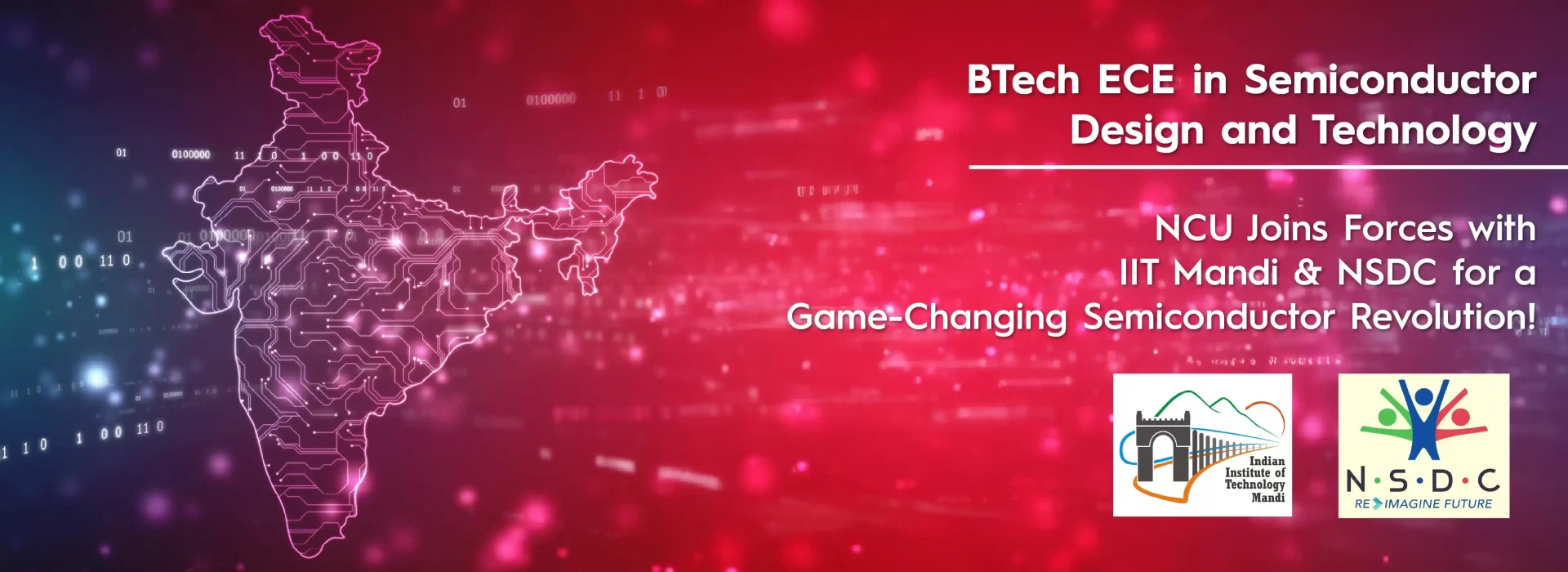
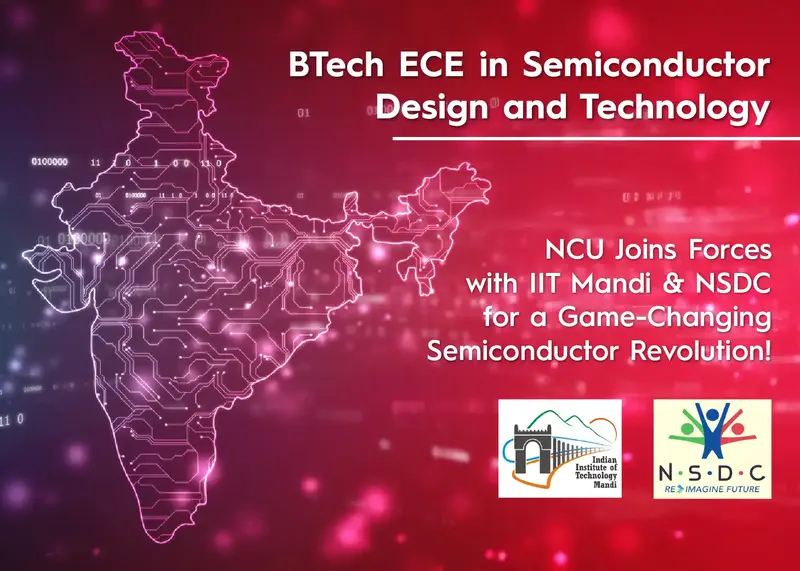
BTech ECE in Semiconductor Design & Technology - IIT Mandi-Certified and NSDC-Backed Programme: Your Gateway to the Semiconductor Revolution!
India’s semiconductor industry is on the rise, projected to be a $110 billion sector by 2030- and NCU is leading the charge with the most advanced, industry-integrated BTech ECE in Semiconductor Design & Technology.
In a groundbreaking partnership with IIT Mandi and National Skill Development Corporation (NSDC), we bring you a programme designed to put you ahead of the curve in chip design, VLSI, and fabrication.
Limited Seats Available - What Sets This Programme Apart?
- IIT Mandi-Certified Excellence – Learn from IIT Mandi professors through specialised courses offered in online, offline, and hybrid formats
- NSDC-Backed Industry Connect – Gain access to top semiconductor firms, skill financing, and career acceleration.
- Cutting-Edge Curriculum – 25 credits in semiconductor design & technology, developed by NCU and verified by IIT Mandi.
- Immersive Learning at IIT Mandi – Six hands-on training sessions in state-of-the-art semiconductor labs.
- Global Career Pathways – Open doors to elite recruiters like Intel, TSMC, NVIDIA, Qualcomm, and more.
Want to be a part of India’s semiconductor revolution? The future is being designed here. Make sure you're part of it!
In the News
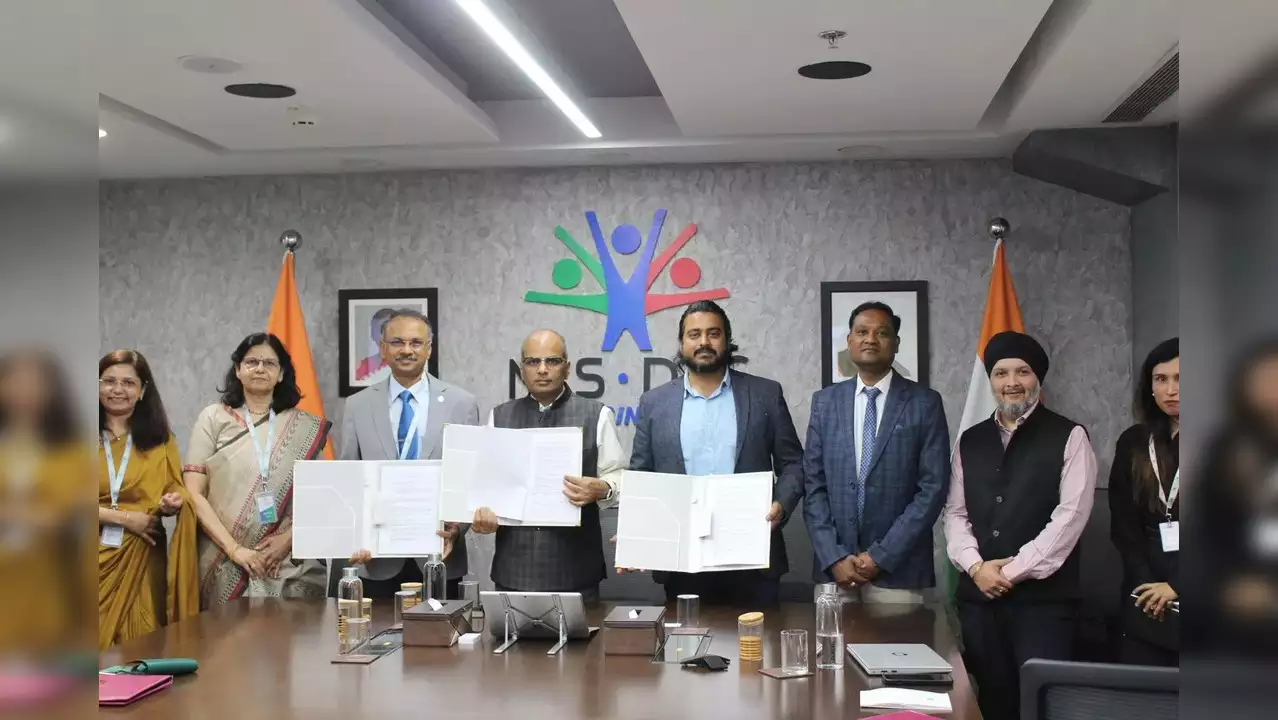
IIT Mandi Signs Agreement with NSDC, NCU to Launch Industry-Aligned Semiconductor Programme
The BTech programme will include 25 credits in semiconductor design and technology, developed by NCU and approved by IIT Mandi. IIT faculty will…
Read More

IIT-Mandi, NSDC, NCU launch BTech in Semiconductor Design & Technology
This initiative presents an opportunity for students to develop cutting-edge technical skills, making them industry-ready professionals in the evolving…
Read More
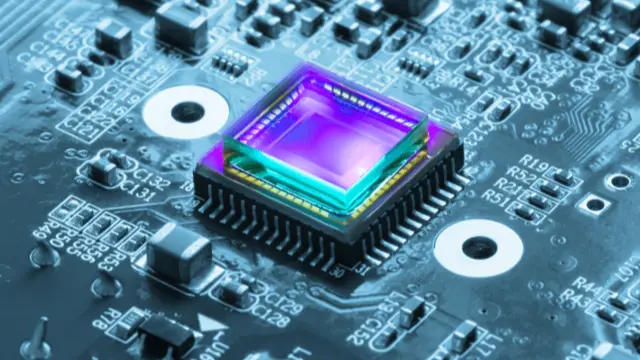
NSDC, IIT Mandi & NCU launch B.tech in semiconductor design & technology
The programme will provide students with industry-relevant knowledge and hands-on training to develop expertise in semiconductor technology…
Read More
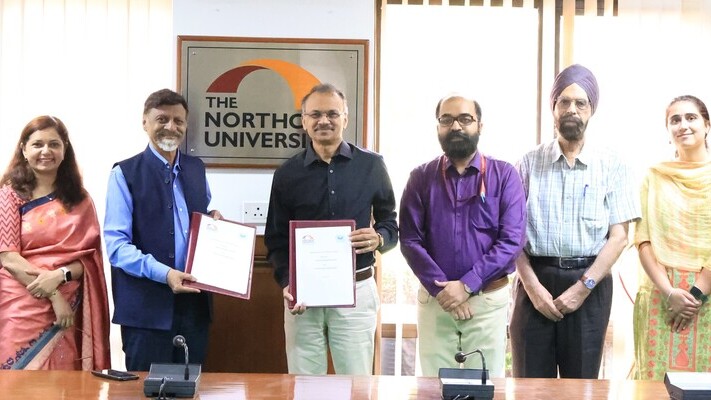
Advancing Excellence in Chip Design and Semiconductor Innovation
NCU is a proud institutional member of the VLSI Society of India (VSI), a premier organisation dedicated to advancing the fields of Very Large Scale Integration (VLSI)…
Read More
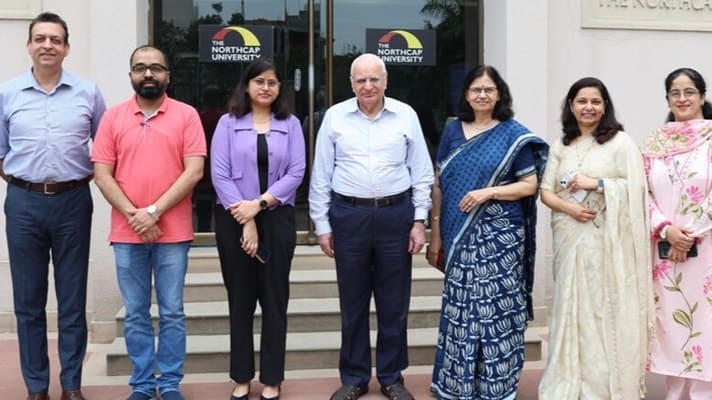
NCU: Member of IESA – Powering the Future of Semiconductor Design and Technology
The NorthCap University (NCU) proudly joins the India Electronics and Semiconductor Association (IESA), a premier industry body driving innovation in the electronics…
Read More
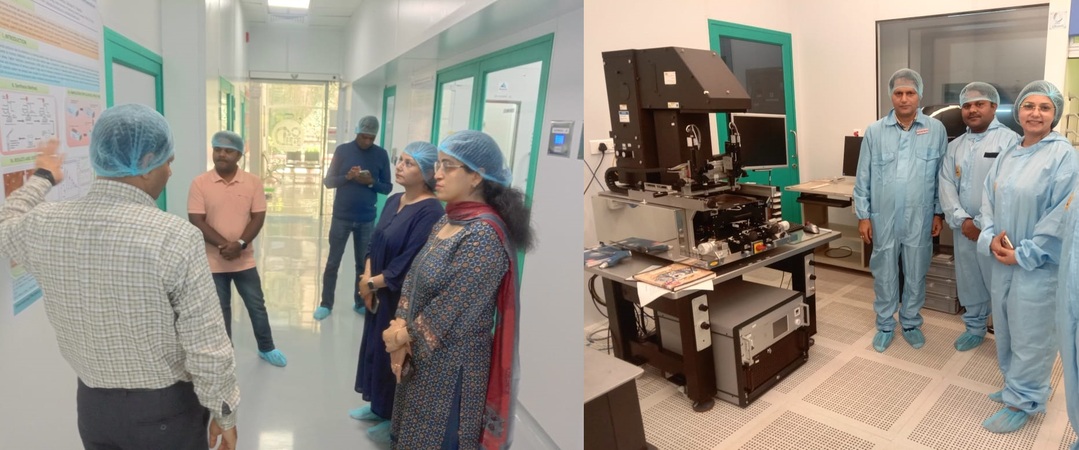
Clean Room Facilities at IIT Mandi & Sahasra
The clean room facility at IIT Mandi and Sahasra Semiconductors Pvt. Ltd., accessible to NCU students, offers a controlled environment for hands-on training in semiconductor fabrication and packaging. Equipped with advanced tools for processes like photolithography, etching, and thin-film …
Read More
Semiconductor Design Lab at NCU
The VLSI Design facilities at NCU are equipped with advanced computing infrastructure and industry-standard tools. Under the C2S scheme, students have access to premier EDA tools such as Cadence, Synopsys, Keysight…
Read More
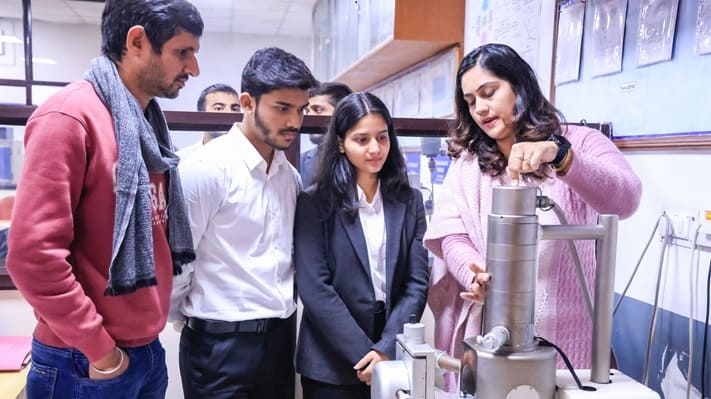
Semiconductor Fabrication and Characterisation at NCU
The state-of-the-art characterisation facilities at NCU provide advanced tools for material and device analysis. Equipped with cutting-edge instruments such as Scanning Electron Microscope (SEM), X-Ray Diff raction (XRD)…
Read More
About the Programme
The B.Tech ECE in Semiconductor Design & Technology is an undergraduate program designed to meet the growing demands of the semiconductor industry. This innovative program combines core principles of semiconductor technology with specialized training in materials, device design, fabrication, packaging, and testing. With a strong emphasis on practical exposure and industry relevance, the program offers students hands-on experience through laboratory work, internships, and collaborations with industry leaders.


Career Avenues
The program is designed to meet the growing skill demand in the semiconductor sector. Job roles in high demand include the above-mentioned opportunities.
International Edge at NCU: Taiwan Collaboration for Semiconductor Excellence
Taiwan leads the global semiconductor industry, producing 60% of the world’s chips and 90% of the most advanced ones. To succeed in this dynamic field, technical expertise alone isn’t enough—you need global readiness.
At NCU, students have access to unique global opportunities through our collaboration with National Tsing Hua University (NTHU), Taiwan. This partnership provides a gateway to advanced semiconductor training, cultural immersion, and direct industry connections—enhancing career prospects in Taiwan’s booming semiconductor sector.
Taiwan Education Centre at NCU
Established in collaboration with National Tsing Hua University (NTHU), The Taiwan Education Centre (TEC) at NCU strengthens academic and cultural ties between India and Taiwan. The TEC provides immersive Mandarin language training and facilitates specialised programs in semiconductor technology. Students gain access to industry exposure, internships, technology exchange, and joint research opportunities with Taiwan’s leading semiconductor firms—enhancing their career prospects in this booming sector. Through this initiative, NCU fosters global readiness, technological expertise, and cross-cultural learning, preparing students for international success.
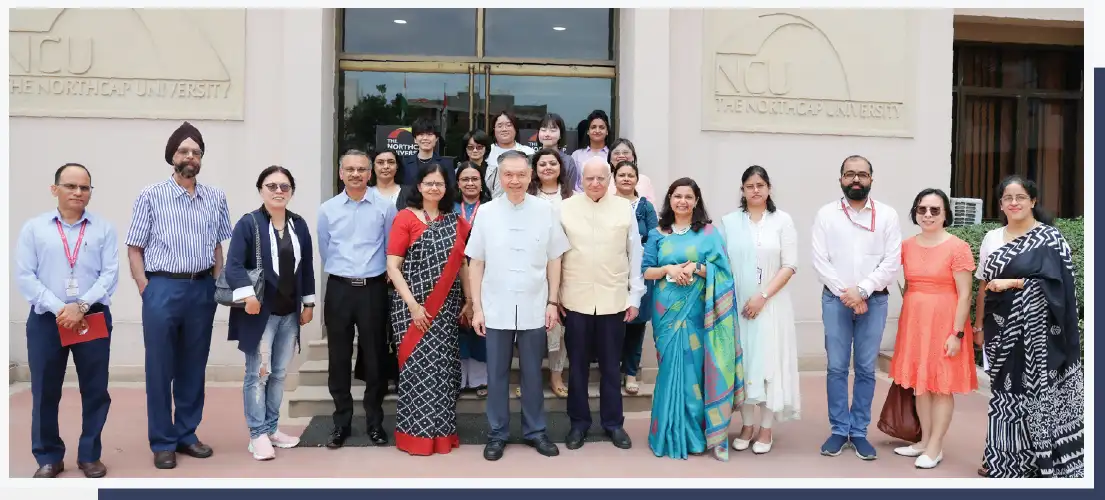
Mandarin Language Training at NCU – Your Path to Global Semiconductor Success!
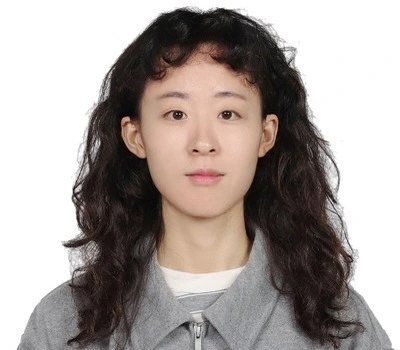
With Taiwan at the forefront of semiconductor manufacturing, NCU ensures students are prepared for international careers. Our on-campus Mandarin course, offered as an Open Elective, is led by Miss Tsailing Liu (Mandarin Trainer, NTHU Taiwan). This programme builds fluency in Mandarin —a crucial skill for those aiming to work in Taiwan’s semiconductor sector.
At NCU, our BTech ECE in Semiconductor Design & Technology equips you with cutting-edge skills while preparing you for careers in Taiwan’s semiconductor giants like TSMC and MediaTek.
Programme Modules
|
Semiconductor Device & Design |
Semiconductor Fabrication |
Semiconductor Packaging |
|
Semiconductor Physics |
Introduction to Microfabrication |
Semiconductor Packaging and Testing |
|
Nano Materials |
Semiconductor Fab Infrastructure |
Materials for Semiconductor Packaging |
|
Analog IC Design |
Semiconductor Fab Processes and Integration Technologies |
Package Design and Simulation Tools |
|
Digital CMOS VLSI Design and Layout |
Semiconductor Materials Synthesis and Characterization |
Industrial Safety for the Semiconductor Industry |
|
RTL Design and Synthesis |
Semiconductor Equipment Design and Technology |
EMC and Signal Integrity |
|
VLSI Verification and Testing |
|
|
Future of Semiconductor technology
Market Trends & India’s Vision in the Semiconductor Field
India’s Semiconductor Mission aims to position the country as a global hub for semiconductor manufacturing and research. With foundries like Tata Electronics, Vedanta-Foxconn, Micron, and ISMC Analog Fab, India is moving toward self-reliance in chip manufacturing. The government’s $10 billion incentive scheme has accelerated investments, fostering economic growth and technological advancements. As semiconductor demand surges and AI-driven applications expand, the need for skilled professionals grows. Pursuing this degree offers a pathway to be part of this technological transformation.
- Rising Demand:A 29% surge in semiconductor needs by 2026 creates a high demand for skilled engineers.
- Growth in Chip Packaging: A booming $43.5B market by 2030 opens career opportunities in advanced packaging.
- AI Revolution: Specialized chips like NPUs and GPUs drive innovation, requiring expertise in semiconductor design.
- Building Resilient Supply Chains: Strengthening domestic production reduces reliance on imports, creating job prospects.
- Innovation & R&D: Advancements in materials, manufacturing, and packaging fuel the need for skilled researchers.
- India’s Strategic Role: As a growing semiconductor hub, India offers expanding career and research opportunities.
- Global Collaborations: Strong ties with Taiwan and the US provide international exposure and industry connections.